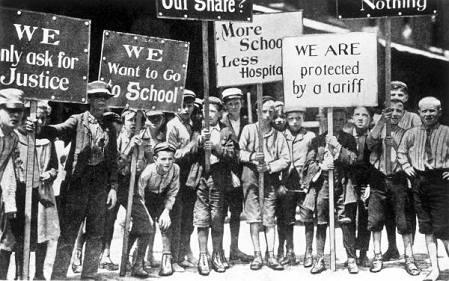We use cookies to make your shopping experience better. By using our website, you're agreeing to the collection of data as described in our Privacy Policy.
How Children Are Radicals
I've been a father for 16 months now.
I think you can make a case that children are pretty radical right from the beginning.
Here are six reasons children are born radicals:

Children protesting against child labour in the American textile industry, early 20th century
1. They constantly challenge authority
We've relaunched our children's aprons, with designs inspired by William Morris and the Suffragettes
See the Radical Children's Aprons
They're little anarchists, really.
Small children literally don't know what the rules are, and this gives them the freedom to experiment and learn about the world.
Maddening, of course, when my son lunges for the scissors!
My impression from other parents is that as children get older and are better able to understand instructions, they may start conforming, but not without at least questioning why... and not without regularly testing the boundaries.
2. They're impatient for change
If the book, the strawberry or the keys are within sight, why can't he have it NOW?! This is a 'quality' that certainly has its downsides.
But as adults and organisations we often promote the worst side of patience: delay, indecision, inaction.
Greta Thunberg saw right through all those adult promises of future action on global warming.
If the status quo needs to change, children want it now.
3. They're blind to society's status hierarchies
Things that don't impress them: university degrees, job titles, salaries, wealth, years of experience, social media followings.
Things that do impress them: being fun, driving a fire engine.
It's about WHO you are, not your social accolades.
4. They have a deep sense of equality and fairness
Researchers used to believe that children's understanding of the principles of equality and fairness emerged gradually from around age six.
More recent research has challenged this and suggests children have an expectation that arbitrarily derived resources will be equally distributed from as young as 15 months, and are able to understand principles of merit by two years old.
Children may initially struggle to incorporate this understanding into their own behaviour, but the view now is that fairness is not just something we construct through our own experiences - it has deeper roots.
Children have an inherent sense of justice and fairness
See the Martin Luther King tea towel
Children aren't born with an inherent dislike of people of different skin colour. If you're nice to play with, you can stay.
They judge you by the content of your character.
6. They force adults to change
As a new-ish parent, it's no longer just about me. I'm reminded every day of my obligations to others. Of their reliance on me, and of me on them.
I have to care about the world of tomorrow, because even if I won't be there, he will.
I doubt he'll let me forget that.





